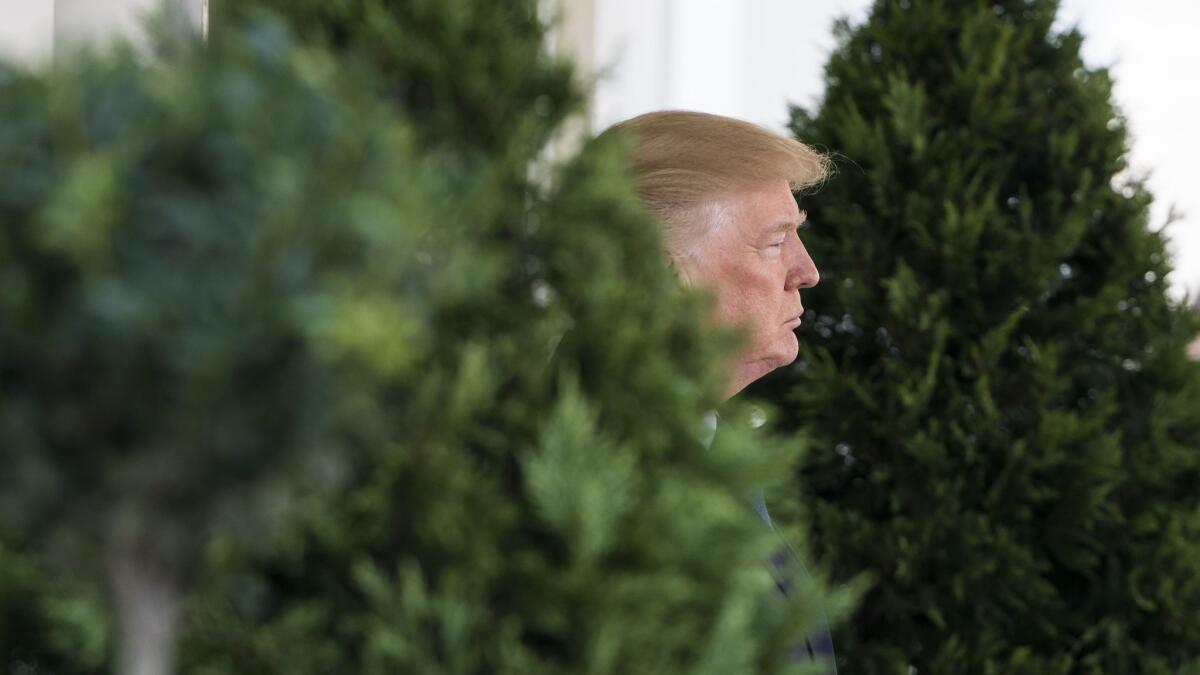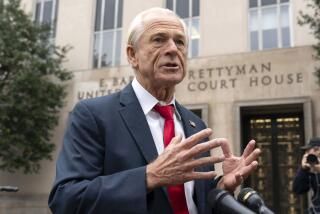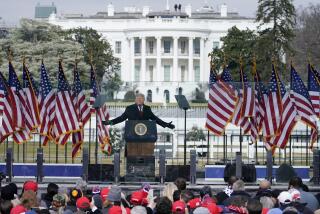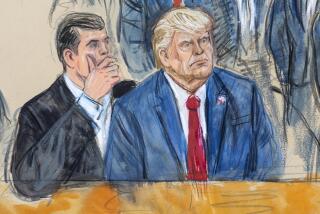Executive privilege, a flashpoint since George Washington, now roils Russia investigation

There’s no mention of executive privilege in the Constitution. Nor was it discussed at the Constitutional Convention, when delegates gathered in Philadelphia in 1787 to draft the country’s bedrock governing principles.
But executive privilege — the president’s right to keep some communications and records secret — has been part of nearly every presidency since George Washington tried to withhold documents from Congress regarding a failed military expedition against Native American tribes.
Washington lost that battle with Congress, but the concept has endured and expanded, providing a reliable flashpoint for political controversies and scandals ever since.
President Trump has not invoked executive privilege to keep his current and former aides from answering questions to Congress about Russian meddling in the 2016 presidential campaign. But the issue emerged in full glare this week when Stephen K. Bannon, Trump’s former strategic advisor, stonewalled the House Intelligence Committee during a 10-hour-long, closed-door hearing by saying the White House had strictly limited what he could say.
Another House hearing scheduled for Friday with Hope Hicks, the White House communications director and one of Trump’s closest confidantes, was indefinitely postponed after it became clear she might follow Bannon’s lead and refuse to answer lawmakers’ questions.
“I wasn’t surprised” about the postponement, said Rep. Tom Rooney (R-Fla.), given the committee’s struggles with Bannon.
Bannon clammed up about the presidential transition, his seven months in the White House and his conversations with Trump after he was fired in August — a gaping timeline that frustrated both Democrats and Republicans. He didn’t open up even when the panel took the unusual step of slapping him with a subpoena during the hearing.
Rep. Adam B. Schiff of Burbank, the top Democrat on the panel, said Bannon refused because “somehow this was covered by a potential claim of executive privilege down the road,” a stance he called “breathtaking” in its scope.
“If the White House is permitted to maintain that kind of a gag rule on the witness, no congressional investigation would ever be effective,” Schiff said.
Bannon’s position grew more puzzling the next day when Rick Dearborn, the White House deputy chief of staff, fully cooperated with the same House committee in closed-door testimony. Executive privilege also didn’t come up last July when Trump’s son-in-law and senior advisor, Jared Kushner, testified to a Senate panel.
The inconsistent approach has frustrated Democrats. Rep. Eric Swalwell (D-Dublin), a member of the House Intelligence Committee, said the White House has hinted at executive privilege to deflect questions without actually claiming it.
“It’s like being pregnant,” he said. “It is or it isn’t. You can’t have a third category.”
Lawyers for Bannon and Hicks did not respond to requests for comment.
Jonathan Turley, a professor at George Washington Law School, doubts Congress will take the next step of holding Bannon in contempt if he continues to refuse to answer questions.
“The Congress has tolerated this type of misuse of executive privilege,” he said. “It would be a curious thing if they actually enforced the principle of congressional integrity and constitutional law.”
There were no consequences for Atty. Gen. Jeff Sessions when he deployed a similar approach to avoid Senate Judiciary Committee questions last June, and again in November, about Russia and his conversations with Trump.
Although the president hadn’t invoked executive privilege, Sessions said, “I am protecting the right of the president to exert it if he chooses.”
The Supreme Court has never ruled on executive privilege in congressional inquiries. But it has set clear limits for criminal investigations.
While Trump can tussle with Congress, he has less power to block special counsel Robert S. Mueller III, who is leading the criminal probe into Russian meddling and whether the president or his aides assisted the Russians or otherwise broke the law.
The defining case was U.S. vs. Nixon in 1974, when President Nixon refused to turn over crucial White House recordings to the special prosecutor investigating the Watergate scandal.
The Supreme Court unanimously said Nixon must turn over the tapes to ensure a fair trial of the Watergate burglars, who had hoped the tapes would show their innocence. But the ruling also formally outlined the president’s ability to withhold information to insulate the deliberative process or protect the confidentiality of some communications.
“Because of that case, we know there’s such a thing as a constitutionally protected executive privilege,” said Susan Bloch, a Georgetown University constitutional law professor.
Nixon resigned a little more than two weeks after the decision, and the issue has popped up repeatedly since then.
President Reagan cited executive privilege to withhold information to Congress on oil leases, environmental enforcement and memos written by William Rehnquist, whom Reagan had nominated to the Supreme Court.
He also resisted answering questions or turning over his personal diaries during the Iran-Contra scandal, which involved the illegal funding of anti-Sandinista Nicaraguan rebels with profits from the covert sale of missiles to Iran.
President Clinton tried to use executive privilege to avoid testifying about his affair with White House intern Monica Lewinsky, but a federal judge rejected the attempt.
President Obama invoked executive privilege to help his attorney general, Eric H. Holder Jr., avoid turning over documents involving the Fast and Furious gun-tracking scandal. He, too, lost in court when a federal judge ruled against him in 2016.
Twitter: @chrismegerian
ALSO
Rep. Devin Nunes plays defense for Trump by going on hard offense against Justice Department
More to Read
Get the L.A. Times Politics newsletter
Deeply reported insights into legislation, politics and policy from Sacramento, Washington and beyond. In your inbox three times per week.
You may occasionally receive promotional content from the Los Angeles Times.







